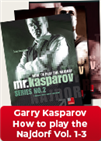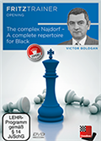Head of the Sicilian clan
Lev Polugayevsky, who died on August 30, 1995, was one of the best chess players in the world in the 1970s and 1980s. He won the Soviet National Championship three times, won six Chess Olympiads with the Soviet team and was a World Championship Candidate — in 1977 and 1980 Polugaevsky even made it to the semifinals there. Above all, his great analyses of the Sicilian Defence have gone down in chess history as a major contribution to the game.
Lev Abramovich Polugaevsky was born on November 20, 1934 in Mogilev, Belarus. The city is situated on the Russian border between Minsk and Smolensk. He spent his childhood and youth in Kuibyshev and completed his engineering studies there before becoming a chess professional. Mikhail Botvinnik had attested his great talent in a publication in 1953, and three years later Polugaevsky already played in the Soviet National Championship. Plenty can be found online about his merits, but here I would like to tell you some personal memories of my encounters with “Polu”.

The Soviet team after winning the 24th Olympiad in Malta: Garry Kasparov, Mikhail Tal, Lev Polugaevsky, Anatoly Karpov, Efim Geller and Yuri Balashov
I got to meet the grandmaster in 1983 in Berlin, where he often stayed at the invitation of a local sports publisher. The latter had published a series of books which included almost all chess openings. Many of the authors were Soviet players, who had a great reputation as opening theorists.
 A great moment when the world's leading expert shares all the secrets in his favourite opening.
A great moment when the world's leading expert shares all the secrets in his favourite opening.
For Lev Polugaevsky, the Sicilian Defence was the opening he had most thoroughly researched throughout his life. The variation 1.e4 c5 2.Nf3 d6 3.d4 cxd4 4.Nxd4 Nf6 5.Nc3 a6 6.Bg5 e6 7.f4 b5 in the Najdorf bears his name.
During his visits to the German Democratic Republic, Lev Polugaevsky was always accompanied by his wife. The culturally-interested couple used to travel to Dresden, among other places, to view the local art gallery. When Polugaevsky arrived as a guest, he usually gave simultaneous exhibitions — the author of these lines had the pleasure of annotating some of the games and sometimes even played along. Since the Maestro always opened with 1.d4, the Grünfeld Defence always showed up on the board, and my great opponent kindly let me get away with a draw every time. So I met him three times in Berlin between 1983 and 1985. The Berliner Zeitung printed our interviews during that period. Since then, things have changed greatly: today, Magnus Carlsen would be the only person of interest for the sports section of the paper.
 Polugaevsky has not only written opening books for Sportverlag Berlin — his 1988 work Verteidigung im Schach is a highly recommended read as well. In it, the author shows with instructive examples the importance of defence. He writes: “The art of defence should be part of every chess player’s arsenal. Many talents have not climbed to the heights of the game because all their sympathy was directed towards the attack and their skills in defence remained insufficiently developed.”
Polugaevsky has not only written opening books for Sportverlag Berlin — his 1988 work Verteidigung im Schach is a highly recommended read as well. In it, the author shows with instructive examples the importance of defence. He writes: “The art of defence should be part of every chess player’s arsenal. Many talents have not climbed to the heights of the game because all their sympathy was directed towards the attack and their skills in defence remained insufficiently developed.”
Lev Polugaevsky quite often played in the West, but it was not always easy. I remember how he had to wait forever for a visa to play at the traditional tournament in Biel in the summer of 1989. At that time I attended a four-week seminar for journalists at the Lomonosov University in Moscow to brush up my language skills. In those days I played truant from time to time and visited the Central Chess Club on Gogol Boulevard. Once I met David Bronstein there, and “Polu” suddenly rushed up the stairs: “This bureaucracy, I still don’t have my passport with the exit visa!” Well, as you can easily see in the MegaBase, things finally worked out so that Polugaevsky could travel down to the Swiss Chess Mecca. His games are listed in the database, and the standings table shows that he shared tournament victory with a young Vassily Ivanchuk.
 When choosing an opening repertoire, there are days when you want to play for a win with Black, when you want to bear down on your opponent’s position with a potentially crushing attack. The Najdorf is perfect for just such occasions. Strategy, combinations, attack and defence, sacrifices and marvellous manoeuvres — exciting chess is all about the Najdorf!
When choosing an opening repertoire, there are days when you want to play for a win with Black, when you want to bear down on your opponent’s position with a potentially crushing attack. The Najdorf is perfect for just such occasions. Strategy, combinations, attack and defence, sacrifices and marvellous manoeuvres — exciting chess is all about the Najdorf!Polugaevsky was also in great demand as a chess coach and worked for a long time as second of Anatoly Karpov during his explosive world championship fights with Viktor Korchnoi. He also began to work more intensively in this direction after the collapse of the Soviet Union. Like many other grandmasters from the USSR, Polugaevsky left his homeland during the perestroika period and emigrated to France, where he lived since the end of 1989. It proved to be helpful that his wife was a French teacher, which naturally made it easier for him to enter Parisian life. In his new home, Polugaevsky trained French chess talents — for example, the young Joël Lautier. He himself also played in the French Chess League as long as his strength allowed it.
Lev Polugaevsky was a friendly man with many interests. As his then son-in-law Christophe Guéneau told us, he was an excellent bridge player, read historical novels and liked to listen to music — from the Russian classics to the Rolling Stones. A tennis fan, the grandmaster watched the Wimbledon tournament every year from the first to the last game.
In 1993, a brain tumour was discovered in Lev Polugaevsky. Despite the cancer, he continued to play tournaments. In Monte Carlo, that same spring, I saw him defeat the then World Cup finalist Nigel Short and the up-and-coming Vishy Anand in rapid chess.
What remains of the grandmaster in my memory above all is his important contribution to chess theory. Lev Polugaevsky received a special tribute on the occasion of his 60th birthday. The Dutch chess patron Joop van Oosterom, a friend of Polugaevsky’s, organized a themed tournament in Buenos Aires in 1994, in which all games were played in the Sicilian. A large part of the world’s elite, including Anatoly Karpov, Vishy Anand, Vassily Ivanchuk and Judit Polgar, travelled to Argentina. Luckily for me, the chess reporter from Berlin was allowed to join the party. The long trip was worth it, and not only because I tried the best steaks I ever ate in my life.
Chess legend Miguel Najdorf visited the tournament every day, which was played in the upper floor of a bank. Often the then 85-year-old grandmaster met there with Lev Polugaevsky. In the press centre the two members of the “Clan of the Sicilians” analyzed the most interesting games together. I am still happy about my snapshots of that time, which are some of the most valuable photos of my career as a reporter.

“Clan of the Sicilians”: Miguel Najdorf, Lev Polugaevsky, 1994
Russian Grand Master Valery Salov won the double round-robin tournament in Argentina with a half point lead over Vishy Anand. I have many pleasant memories of my longest journey as a chess reporter, which certainly would not have taken place without Lev Polugaevsky. I will never forget the tango dancers at the opening ceremony or the evening we spent in the most famous steakhouse of Buenos Aires with Anatoly Karpov, his wife Natalja and two other grandmasters. Can you imagine, dear readers, that our whole round after dinner with juicy steaks and good wine did not have to pay a single peso? The simple explanation: the fact that the 12th world chess champion came to this restaurant was an exceedingly great honour for the owner of the place. Argentina — chess dreamland!
“I have dedicated my whole life to the Sicilian Defence”, Lev Polugaevsky had said in a speech at the beginning of the ‘Tango Tournament’. Barely a year after the Buenos Aires event, he succumbed to his serious illness in Paris at the end of August 1995. The grandmaster’s grave is located on the world-famous Cimetière Montparnasse, not far from Alexander Alekhine’s final resting place.
P.S. When French actor Michel Piccoli (1925-2020) died this spring, I was involuntarily reminded of Lev Polugaevsky. Don’t the two men look alike? The chess player could have easily been the younger brother of the world-famous mime.

Piccoli and Polugaevsky
A brilliant counterattacker
Lev Polugaevsky showed his creativity in the opening — he could manoeuvre finely and use even the smallest of his opponent’s mistakes virtuously. He was a master of the counterattack.
Select an entry from the list to switch between games
Links
























